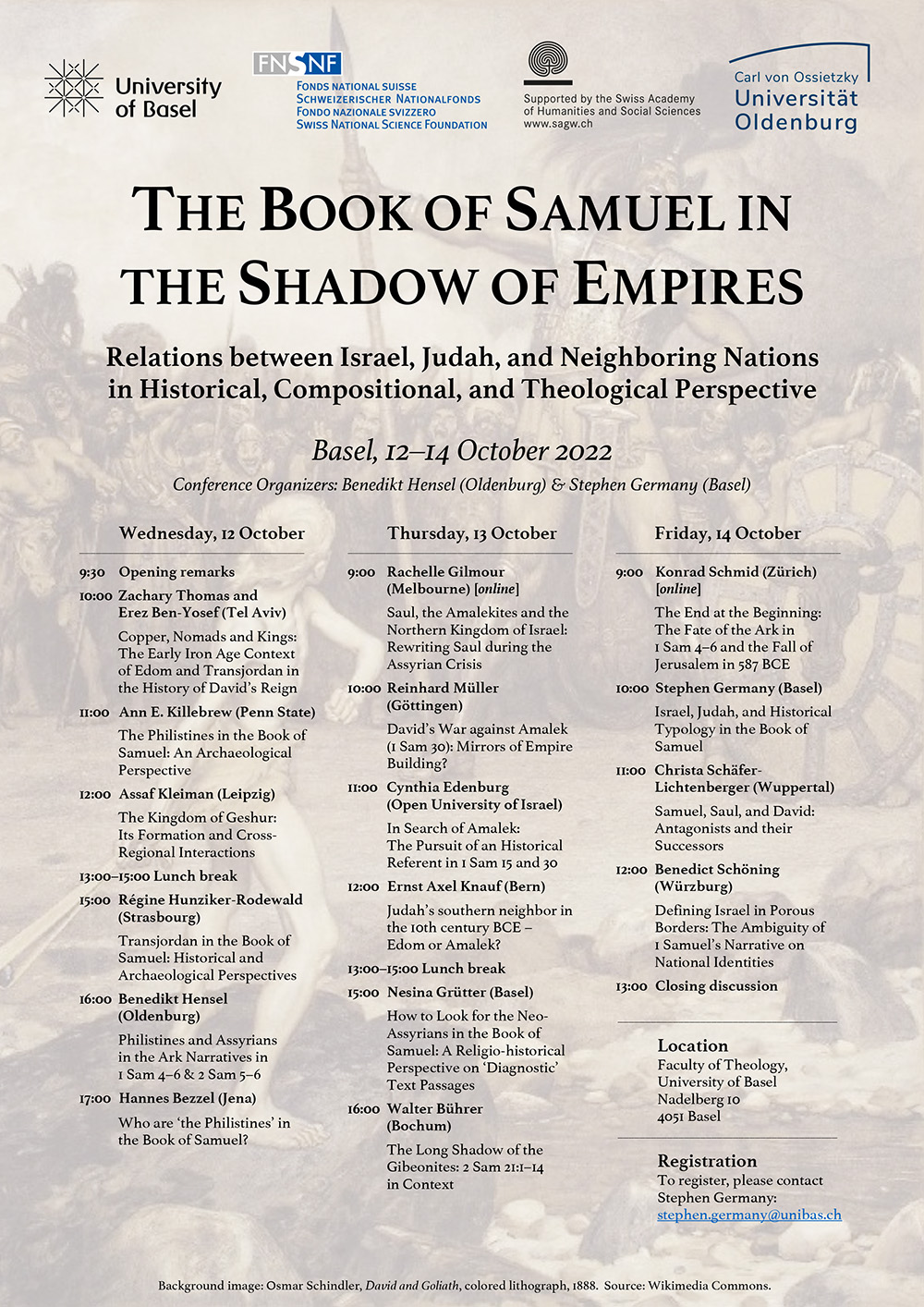The Book of Samuel in the Shadow of Empires. Relations between Israel, Judah, and Neighboring Nations in Historical, Compositional, and Theological Perspective
Conference at the University of Zurich, Theologische Fakultät, 26–28 January 2022
Update 12/23/2021: Due to the COVID-situation the conference has been postponed to 12th-14th October 2022. Place of the conference will now be the University of Basel.
Organizers:
Benedikt Hensel (Zurich)
Stephen Germany (Basel)
About the Conference
Israel’s and Judah’s relationship with other ancient Near Eastern nations is a theme that permeates the book of Samuel on multiple levels of interpretation. Within the narrative world of the book, the decisive cultural-political transition to kingship is closely tied up with Israel’s relations with neighboring peoples. The book recounts the story of the early monarchy through its main protagonists Samuel, Saul, and David and their contacts and conflicts with neighboring nations, such as the Philistines, Edomites, Arameans, Moabites, and Ammonites. Given this panoply of neighboring nations in the book of Samuel, it is all the more striking that not a word is said explicitly of the major ancient Near Eastern empires that presumably loomed in the background at the time when the book was written, namely, the Assyrians, Babylonians, and Persians. And yet, as recent research has shown, the composition and ideology of book of Samuel clearly bear the mark of Israel’s and Judah’s experiences under the latter empires.
Several questions thus arise: What narrative function do foreign nations and empires serve within the world of the text? What can be said about the nations and empires described in the text from the perspective of extrabiblical evidence, such as archaeology? To what extent does the text reflect the historical conditions of the period in which the narrative is set (i.e., the late Iron Age I) versus those of the later periods in which the book developed? What might the book of Samuel have to say about Israel’s and Judah’s experiences under the Assyrian, Babylonian, and Persian Empires and biblical scribes’ attitudes toward these empires or toward the concept of empire more broadly?
A closer look at the representation of neighboring nations as well as the theme of empire in the book of Samuel from multiple perspectives – archaeology, compositional development, and his-toriographical and theological function – serves as a gateway to understanding the historical back-ground and literary history of the book of Samuel more broadly. Here, it is crucial to maintain a clear distinction between these different levels of interpretation and methodological approaches (which have not always been adequately distinguished from each other in previous research) in order to reach a historically sound interpretation of the book.
This more nuanced approach to the discourse on foreign nations and empires in the book of Samuel stands at the center of the conference.
This interdisciplinary conference will place a special focus on integrating the results of ongoing archaeological excavations and international research projects relating to Israel’s neigh-bors (particularly the Philistines, Edomites, and Arameans) with current narratological and literary-historical analyses of the book of Samuel. The major methodological approaches are reflected in the three main sections of the conference: (1) The Nations and Empires of the Book of Samuel: Historical and Archaeological Perspectives; (2) Nations and Empires as a Catalyst in the Formation of the Book of Samuel; and (3) Nations, Empires, and the Construction of Israelite Identity in the Book of Samuel.
Publication of the conference as:
The Book of Samuel in the Shadow of Empires: Relations between Israel, Judah, and Neighboring Nations in Historical, Compositional, and Theological Perspective (Series: Orientalische Religionen in der Antike / Research on Israel and Aram in Biblical Times), edited by Stephen Germany and Benedikt Hensel, Tübingen: Mohr Siebeck.
